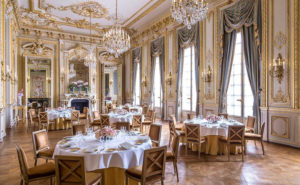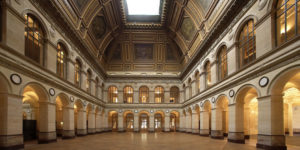
Paris est le lieu incontournable des événements de prestiges et de luxe, cette capitale abrite des lieux haut de gamme qui allient raffinement et culture. Pour marquer les esprits et créer l’émotion, le lieu doit être à la mesure de l’événement et refléter votre image. Un grand mariage, une soirée caritative, un dîner de Gala ou une soirée de lancement de produits, voici notre sélection des salles parisiennes les plus prestigieuses pour vous orienter dans votre choix.
Le Mandarin Oriental

Pour vos événement mode, chic et glamour, Le Mandarin Oriental est le lieu incontournable pour créer l’événement. Situé rue Saint-Honoré, fief des maisons de haute couture et de l’élégance à la française, l’hôtel offre une large gamme de service pour vos mariages et lunes de miel, vos événements spectaculaires et soirées intimes, vos séminaires et réunions d’affaires. L’hôtel se distingue aussi par son impressionnant bar, avec un éclairage tamisé et un service raffiné. Le Bar 8 dispose d’un jardin extérieur pour vos soirées d’été.
Intercontinental Paris Le Grand

Envie d’organiser un dîner gala, une soirée caritative, votre mariage ou encore votre anniversaire ? L’Intercontinental Paris Le Grand propose une panoplie de salles. Le salon Opéra offre une ambiance raffinée pour vos dîners gastronomiques et soirées glamour avec une architecture à couper le souffle, imaginé par Charles Garnier en personne, un superbe lustre en cristal en pièce centrale entouré de colonnes en marbre et de miroirs qui reflètent la grâce des statuts féminines. Le salon Ravel offre un lieu très convivial pour vos cocktails et soirées décontractées.
Shangri-La Paris

Un événement romantique doit se fêter dans un lieu qui offre de l’émotion et du plaisir. Le Shangri-La Paris est le lieu idéal pour vos mariages, nuits de noces. Ses salles, de style Louis XIV, offrent une ambiance féérique dans une architecture majestueuse digne d’un événement somptueux. Tous les services sont conçus autour de ce cadre, décoration florale, menus gastronomique, animations et open bar… Et pour couronner le tout, une vue céleste sur la Tour Eiffel depuis la terrasse pour un moment magique et historique.
George V Paris

Une légende parisienne, L’hôtel Georges V Paris est niché au fameux Triangle d’or de Paris, véhicule le charme et l’élégance à la parisienne. Salons de réception, décorations florales, menus gastronomiques, l’hôtel offre des services à la hauteur des attentes d’un mariage somptueux ou d’une soirée gala. Il dispose de 3 restaurants étoilés au guide Michelin pour régaler vos papilles, 7 salons qui s’adaptent à tous les événements et bien évidemment des suites de rêve pour des nuits de noces romantiques ou un hébergement au calme.
Palais Brongniart

Un monument historique qui fait partie du patrimoine parisien, Le Palais Brongniart est l’un des premiers centres d’événements à Paris, il offre un espace de 3000 m² pour accueillir des Assemblées Générales, séminaires et conférences, des défilées de mode, des congrès et salons professionnels. C’est un lieu incontournable des événements autour des nouvelles technologies et des innovations économiques, sociales et solidaires.
Yacht Joséphine

Vous voulez embarquer dans une expérience à couper le souffle, Yacht Josephine offre une expérience unique pour gouter au plaisir d’une croisière au cœur de Paris avec toutes les exigences d’un service raffiné et chic et savourer un moment idyllique avec vos convives ou passer un moment romantique. Ce lieu est idéal pour célébrer des mariages, pour des shooting photos, ou vidéos, des lancements de produits, des réunions ou des dîners d’affaires puisqu’il offre un confort associé d’un service raffiné et une grande convivialité.
Salle Wagram

La Salle Wagram est un joyau historique, elle a été le lieu des grands bals de l’époque de Napoléon III. Cette salle mythique fera le lieu par excellence de vos soirées d’anniversaire d’entreprise, des mariages somptueux, des concerts de grande envergure, des défilés de mode, soirées de gala et lancements de produits.. Le lieu est totalement flexible et s’adapte aux formats de vos événements que ce soit en soirée ou en journée. Dîners assis, cocktails, conférences, une équipe technique est à votre disposition pour tout aménager selon vos besoins.
Salon des Miroirs

Le Salon des Miroirs incarne le chic parisien avec ses miroirs d’époque, les détails des pièces décoratives et des jeux de lumières. Son éclat de blancheur offre une ambiance nuptiale parfaite pour des mariages élégants et romantiques. Les jeux de couleurs créé plusieurs cadres à personnaliser selon tous les goûts et besoins, c’est qui le rend très sollicité par les défilés de modes, les lancements de produits de luxe.
Le Palais Garnier

© Lucie & Simon / OnP
Un vrai chef-d’œuvre de Charles Garnier, décors et bustes sculptures, le Palais Garnier est conçu pour accueillir un auditoire raffiné, passionné par la culture et l’histoire. Le Grand Foyer offre un jeu des miroirs avec un magnifique plafond qui illustre l’histoire de la musique. C’est un monument de l’histoire de la France et le lieu incontournable pour tous vos événements luxueux et haut de gamme qui reflète votre image et vos valeurs.
Le Pavillon Royal

Adapté à tous les événements, mariages, cocktails, séminaires et conférences, les salons du Pavillon Royal conviennent parfaitement aux différents formats d’événements, elles sont modulables et personnalisables et disposent d’équipements techniques pour vos installations. Les 800m² de terrasses verdoyantes offrent au lieu une fraicheur et une vue imprenable sur le lac.


